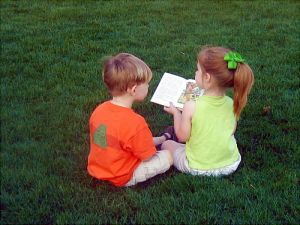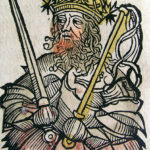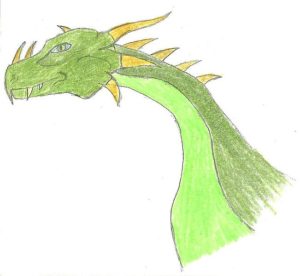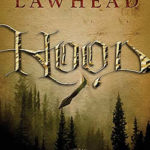The Making Of A Myth, Part 3
 Last time, in looking at J. R. R. Tolkien’s essay “On Fairy-Stories,” I introduced the idea that fairy stories are not primarily for children. The Master of Fantasy suggested that the appeal of fantasy was innate and actually grew stronger as one aged. My focus in Part 2 centered on that idea of “innate-ness,” but this week I’d like to look a little more deeply at the idea that fairy tales are not primarily for children.
Last time, in looking at J. R. R. Tolkien’s essay “On Fairy-Stories,” I introduced the idea that fairy stories are not primarily for children. The Master of Fantasy suggested that the appeal of fantasy was innate and actually grew stronger as one aged. My focus in Part 2 centered on that idea of “innate-ness,” but this week I’d like to look a little more deeply at the idea that fairy tales are not primarily for children.
Contrasting his own experiences and beliefs about fairy stories with that of Andrew Lang, the author of “the twelve books of the twelve colors,” Tolkien concludes
it will be plain that in my opinion fairy-stories should not be specially associated with children. They are associated with them: naturally, because children are human and fairy-stories are a natural human taste (though not necessarily a universal one) … unnaturally, because of erroneous sentiment about children
This “sentiment about children,” he believed, led to some delightful stories, but also to some attempts at sanitizing fiction for children that were less than desirable:
It has also produced a dreadful undergrowth of stories written or adapted to what was or is conceived to be the measure of children’s minds and needs. The old stories are mollified or bowdlerized, instead of being reserved; the imitations are often merely silly … or patronizing; or (deadliest of all) covertly sniggering, with an eye on the other grown-ups present. I will not accuse Andrew Lang of sniggering, but certainly he smiled to himself, and certainly too often he had an eye on the faces of other clever people over the heads of his child-audience…
I couldn’t help but think of the Shrek movies which certainly do allow adults to snigger over the heads of the child-audience. But in what way can fairytales be adult stories, if not for “insider” lines that allow adults to take away more meaning from the story than do children with less experience or understanding?
Tolkien, in fact, believed adults will and should take away more but that stories should not reshape Truth. He gave one particular instance of a story in which a character died in what author Andrew Lang called a “fair fight,” apparently the only means he felt to be justified for children to experience death since he hated cruelty. Tolkien responded,
Yet it is not clear that “fair fight” is less cruel than “fair judgement”; or that piercing a dwarf with a sword is more just than the execution of wicked kings and evil stepmothers — which Lang abjures: he sends the criminals (as he boasts) to retirement on ample pensions. That is mercy untempered by justice.
In many ways Tolkien separated himself from Christian parents today because he stated bluntly that children aren’t to be protected from reality though they can and should retain the guileless wonder of childhood:
Children are meant to grow up, and not to become Peter Pans. Not to lose innocence and wonder, but to proceed on the appointed journey: that journey upon which it is certainly not better to travel hopefully than to arrive, though we must travel hopefully if we are to arrive. But it is one of the lessons of fairy-stories (if we can speak of the lessons of things that do not lecture) that on callow, lumpish, and selfish youth peril, sorrow, and the shadow of death can bestow dignity, and even sometimes wisdom.
Contrast this to what author Brock Eastman (Taken, P&R Publishing) said about his work:
death is portrayed so lightly these days on television and in other media, so I set out to write a book where no one would die, or if someone did, it would not be taken lightly. As a Christian, I recognize that death should not be glossed over (quoted in “Fantasy Friday – Introducing Brock D. Eastman”)
Tolkien’s thinking was that there should not be two classes of people — adults and children — with each having “their” kind of literature. But the natural question that followed was, What value do fairy stories have for adults? To which he answered
First of all: if written with art, the prime value of fairy-stories will simply be that value which, as literature, they share with other literary forms. But fairy-stories offer also, in a peculiar degree or mode, these things: Fantasy, Recovery, Escape, Consolation, all things of which children have, as a rule, less need than older people.
A little over a year ago, author and blogger Mike Duran decried the fact that so much of Christian speculative fiction is written for young adults. He concluded his post “Why is Christian Spec-fic Mostly YA?” with this:
It’s bad enough that speculative fiction is under-represented in Christian bookstores. What’s worse is that the stuff that IS there, is mostly for kids.
It seems to me Mike is saying today’s Christian speculative fiction, aimed mostly at youth, does what Tolkien saw in Lang’s work. This leads me to ask, Shouldn’t Christians write stories that are truthful and exciting for readers across generational boundaries? Why shouldn’t adults enjoy stories about the Pevensie children or about a fifty-year-old hobbit? Why must we buy into the “their stories, our stories” divide? Is it inevitable in the current publishing climate that stories with youthful protagonists will automatically be categorized as for youth?
Consider what D. Barkley Briggs, author of the Legend of Karac Tor (AMG Publishing), recently said in his interview at Novel Rocket with Sally Apokedak:
I challenge the notion that I’ve written YA fiction. These may be useful marketing terms, but I think they’re sometimes a bit arbitrary and unhelpful, not to mention inaccurate, since I probably have as many adults who enjoy my series as teens. I don’t like the idea of “dumbing down” for the youth market. I simply have young protagonists. It’s fantasy fiction, period…packaged as YA.
How about you? Do you think there should be adult fantasy and children’s fantasy because adults want a little more “bite” than stories with “lots of dragons, elves, and swordsmiths” can give?












































I’ve read juvie fantasy and adult fantasy. Both kinds, when they’re poorly-written, are just poorly-written on either side of the fence. When they’re well-written, they’re excellent.
About the only thing I’ve seen that separates juvie fiction (including all the flavors of juvie, like middle-grade and young-adult) from regular adult fiction is the age of the protagonists, and the amount of graphic sex. I seldom meet sex in juvie fiction, and when it does occur, it’s off-camera or explained in such a way that a kid won’t get it.
But then, that sort of thing is an adult topic, and of course discussed in adult books. I’ve read plenty of adult books with child protagonists alongside adult protagonists, and plenty of juvie fiction with adult and child protagonists. So I don’t know where the divide falls in that respect.
And really, I’ve noticed that juvie fiction seems to soar on wilder wings than adult fiction. Juvie fiction seems to have fewer fetters and never seems to delve quite as deeply into the darkness as adult fantasy. It’s free to be a lot more …. original, I think is the term I’m looking for.
Kessie, you’re right. The bottom line, the story has to be well-written. Then its popularity will take care of itself. I’m of the mindset that adults don’t need graphic sex any more than young people do, and kids need to learn where babies come from so writing about sex doesn’t have to be some great taboo. People forget, when society was largely rural, kids saw animals copulating and saw live births, so they knew a lot about sex without having to go into their parents’ bedroom and watch. Essentially that’s what graphic sex does — it takes readers places we think are morally wrong if we were to go there physically.
Becky
Bryan Davis has two complimentary series set in the same worlds, but he labeled one as adult and the other young adult because one has descriptions of forced breeding, even though the descriptions are not graphic.
Other than that sort of thing, I think age-based descriptions are stupid. I still read DiCamello and Tolkien with equal interest…
I haven’t read Bryan’s adult books. So in essence, you’re saying the only difference is the subject matter. Interesting. I thought perhaps he would have an adult protagonist for those books.
I had a lot of the 7th and 8th grade students I taught read “adult” fiction. The juvenile fiction at the time seemed very juvenile, to be honest. And how slow the publishing industry works, by the time a book came out, the fads and fashions were already outdated. Kids care about such things. Fantasy or science fiction generally make those points moot.
The one thing I think that might make juvenile fiction legitimate is vocabulary. Based on reading proficiency, some kids can’t handle adult books, but they shouldn’t be left out. They need to learn to love stories and reading, too.
Becky
The adult series follows the older, 20-something-year-old brother and the YA follows the younger, 15-year-old brother. You kinda get the idea in the latter, whereas the former is more straightforward about what’s going on. I don’t think his youngest readers will pick up on it (though I think it’s a 50-50 the teenagers will). In this case, the subject matter was the same, but the treatment was a bit different.
Actually, Galadriel’s right, that particular set lends itself to a great comparison, being the same world with both protagonists working toward the same end, especially since Bryan can get the point across without being graphic for the adult set and keep things G without being absurd for the YA. (Although, that point alone is also likely a case-in-point against ‘age-based descriptions.)
I sort of get you, there, Galadriel, but on the other hand some things are an age-appropriate thing. I’m not going to answer a fourteen-year-old girl in exactly the same way I would a college girl. (For that matter, I wouldn’t answer a guy in exactly the same way I would a girl, depending on the subject.) It’s possible to indulge the art of tact and still get across everything necessary; it just takes some extra effort sometimes.
Galadriel: One word – Marcelle. 0=)
The word tact made me think of someone else, someone who needs it– Elyssa
As for age, I subscribe more to Lewis’s “a book is not worthy of being read at four which cannot be read at forty with equal enjoyment.” Or something along those lines.
Hahaha. Yeah, but for some reason I think she’s cute for her lack of tact. Probably because it speaks more to her innocence than anything else. I mean, her idea of ‘forward’ is borrowing Jason’s cloak before asking.
What surprised me is it’s Cassabrie who’s the wild child (from the other set, for those whom Galadriel and I just completely left in the dust).
Thanks for sharing this and for bringing up such an interesting discussion. It’s one that I am sure will cause for lots of differing, but honest opinions.
What started my quest to write a series without death (or if it occurred I would include a useful lesson and explanation to kids on death)? I was having a conversation with my friend, and he mentioned having read an article in Reader’s Digest (that was indeed a true story) about a spy. The spy killed someone, and when my friend had finished reading he realized, ‘wow I just read about someone dying and it came across as entertainment to me.’ He hadn’t stopped to consider that this person actually died, they had a soul, and they were either sent to Heaven or Hell. This shocked him to realize that even in a written article, death could come across to him as a vessel for entertainment. The conversation made me consider the fact that many indeed are becoming desensitized to death (along with many other things, language, sex, drugs, etc.) We look past what happens to one whence upon they die. Where will you go? Where do they go?
Read the rest of my thoughts here:
http://thequestfortruthbooks.blogspot.com/2011/11/jrr-tolkien-and-i-dont-see-eye-to-eye.html
Check out this interview she did on me last Friday:
http://rebeccaluellamiller.wordpress.com/2011/11/25/fantasy-friday-introducing-brock-d-eastman/
Thanks for weighing into the discussion, Brock.
Interestingly, I deal with death as one of my central themes in my first book. I was raised as a pacifist, so when I came to the first battle in my story, I had a decision to make. It was not an easy one, believe me. In the end I decided, death needed to be something my characters grapple with, both killing and losing loved ones. It’s an important issue, I think.
Becky
To me, “insider” lines suggests items artificially inserted into the story, as often occurred in Shrek, for the purpose of adult amusement. This contrasts with the fact that through much of history fairy stories were primarily intended for an adult audience, a topic which I explored in this post, “Are Fairy Stories Only For The Young?” Rather than certain lines or elements being added to the stories to make them appealing to adults, the tales were actually simplified to be more accessible to children.
Overall, I tend to agree with Tolkien that there are not separate classes of stories and with your statement that “Christians [should] write stories that are truthful and exciting for readers across generational boundaries.” I loved The Hobbit and Lord of the Rings as a young child, and I love the Narnia series as an adult. Good stories will entertain and provoke thought in readers of all ages, though they may perceive different things in the stories as they age.
Granted, sometimes the content will make a book a better read for an adult than a child or differences in tone that will make the story more suited for older or younger readers, but often I think the divisions between the two are artificial.
I agree, Sarah. You’re absolutely right. The fact that adults will understand something more because of their broader knowledge and experience isn’t the same thing as an author writing to exclude the younger reader from knowing what he wants the adults to know. The latter is what the writers of Shrek did, I think.
I’m glad you linked to your article on this topic. I would have been wise to do so in my post! 😛
I also left off probably my favorite quote from “On Fairy-Stories,” at least dealing with this subject:
(Did you use that one in your post? It seems I’ve read it elsewhere not that long ago.)
Becky
I agree that adults and children enjoy some of the same fantasy/fairytale books—Sarah pointed us to The Hobbit as one of the best. As a little girl and as a woman, I’ve enjoyed another of the best imaginings, the film The Red Shoes, an adult adaptation of Hans Christian Andersen’s story.
However, some authors are devoted to each audience, and should be; that’s their forte and love, and the audiences are essentially different. Children lack the experience that can make a subtle tale fascinating. Children understand many things but are still unfolding as people. And, as Brock knows, they need and should have our protection. This comes into play not only with raw sex and meaningless death, but as someone hinted, with keeping them from too much grief. Life will soon bring it their way, and the Lord takes our ‘meanwhile’ protection seriously. They are a different sort of creature, I feel—and if I’m remembering rightly, this isn’t something Tolkien agreed with.
In their subtly, or satiric tone, adult fairytales fly (forgive the pun) over children’s heads and fail to hold their attention, unless they contain startling eyefuls/earfuls; while adults can be engrossed by subtlety, or amused and bettered by satire.